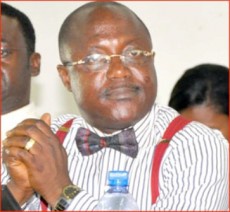
Professor Ken Attafuah, a Legal Practitioner, has said the activities of foot soldiers is a threat to Ghana’s democratic order and must be curbed to ensure that the rights of the citizen and the course for development is protected.
He said the growing and unchecked political lawlessness by foot-soldiers constitutes a major threat to human security in Ghana, which was typified by commotion in urban centers, visiting terror on Presidential appointees and taking control of public facilities such as toilets.
Prof. Attafuah said this when speaking on the topic: ‘Curbing Foot-Soldierism in An Election Year: “The Way to Go,” at a three-day workshop organized by the Institute of Economic Affairs (IEA) under the Ghana Political Parties Programme.
The event which was held at Akosombo was under the theme: Towards A Peaceful Elections: “The Role of the Ghanaian Youth”.
Prof Attafuah said foot-soldiers were not entitled to seize public facilities because their party was in power and allowing this to continue would create problems for our development.
He said the phenomenon of foot-soldier activism in Ghana presents a major challenge to liberalism and that they exist outside the officially-sanctioned mainstream politics of the society.
He said, foot-soldiers are known to use violence and aggression to expel appointed leaders, lock-out elected officials, influence the dismissal of Ministers, MCEs and DCEs; impact government appointments and policies, and generate a cocktail of confusing and contradictory responses to their actions from political party leaderships.
Reverend Fred Deegbe, General Secretary of the Christian Council of Ghana, said the youth form a very important component of every country and constitute the most active working force of the population who can either be an agent for peace or violence, depending on how they are treated and managed.
He said the youth have a very critical role to play in curbing electoral violence adding that the National Youth Policy of Ghana (2010) places an emphasis on the role of youth in peace building.
Rev. Deegbe, who was speaking on the topic: Curbing Political Violence Before, During and After the 2012 Elections: “The Role of the Youth,” noted that electoral violence usually occurs as a result of several electoral offences which include bribery, publication of false statements, obstruction of voters, misconduct at campaigns, failure by presiding officers to furnish election returns, unauthorized voting or multiple voting, impersonation, defacement of posters, obstruction of election officers and undue delays in voting.
He called on the youth to boldly come out and condemn politicians who are fond of using abusive language, adding that, they represent the future aspirations of the country.
Rev. Deegbe said it was a collective responsibility to ensure that the youth who are actively involved in the electoral process must also avail themselves as instruments of peace and development to sustain the country’s democratic credentials.
“No matter the political inclination you may have, always put Ghana first and ensure that your future and that of the younger generations are secured by contributing your part in ensuring that the December elections are peaceful, credible, free and fair.”